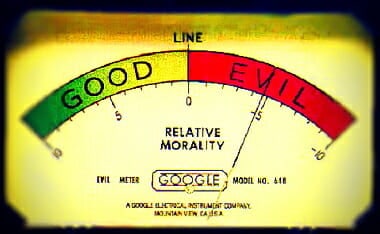(Originally posted Sept 2017)
A chap in a Facebook group posted a few points in a post, of which I took this point up to respond to.
- …My moral values have a simple root…if an action causes harm to another person, that act is immoral. If my inaction causes harm to another person, that inaction is immoral…
I first posted this as a response:
- You would have to define and then implement this definition in a way that non-theistic governments would accept (like the many Eastern-block countries of our past for example). Some countries would view the disabled and farmers as harming society, and thus view the moral rout for said society as a whole to rid themselves of these persons/groups. They would say to NOT do so causes harm.
BUT, I didn’t have to really do any heavy lifting… this person did it for me. After reading through the discussion, the same person said this:
- …Morality actually derives from human self interest in preserving the group they needed to be part of to survive in a hostile world. It had to be a feature in the lives of the earliest human ancestor species…
To which I replied:
Oh, this comment refutes you OP [original post]. “Morality actually derives from human self interest in preserving the group they needed to be part of to survive in a hostile world.”
So another group’s morality to survive in a hostile world (say, Pol-Pot, Stalin, Hitler, Caesars, etc) are just as “moral” then. Unless you are saying that there is a universal code you are tapping into to compare/contrast, and put on a higher plane? Not only that, but you would need to argue that another person would have to have that same ability…. At least if you are expecting your OP to carry any weight.
Otherwise you are merely here expressing your preference (emoting), like my children telling me they prefer chocolate ice cream over vanilla.
Not only that, but the majority group, whether in a country or in the world, would decide this ethos (what it “means” to survive). And thus, to speak out against this consensus (whether is science or in morality) would be immoral.
BONUS!
A couple examples of this ethos at work:
“Everything I have said and done in these last years is relativism by intuition…. If relativism signifies contempt for fixed categories and men who claim to be bearers of an objective, immortal truth… then there is nothing more relativistic than fascistic attitudes and activity…. From the fact that all ideologies are of equal value, that all ideologies are mere fictions, the modern relativist infers that everybody has the right to create for himself his own ideology and to attempt to enforce it with all the energy of which he is capable.”
Mussolini, Diuturna (1924) pp. 374-77, quoted in A Refutation of Moral Relativism: Interviews with an Absolutist (Ignatius Press; 1999), by Peter Kreeft, p. 18.
“The stronger must dominate and not mate with the weaker, which would signify the sacrifice of its own higher nature. Only the born weakling can look upon this principle as cruel, and if he does so it is merely because he is of a feebler nature and narrower mind; for if such a law [natural selection] did not direct the process of evolution then the higher development of organic life would not be conceivable at all…. If Nature does not wish that weaker individuals should mate with the stronger, she wishes even less that a superior race should intermingle with an inferior one; because in such a case all her efforts, throughout hundreds of thousands of years, to establish an evolutionary higher stage of being, may thus be rendered futile.”
Adolf Hitler, Mein Kampf, translator/annotator, James Murphy (New York: Hurst and Blackett, 1942), pp. 161-162; found in: Norman L. Geisler & Peter Bocchino, Unshakeable Foundations: Contemporary Answers to Crucial Questions About the Christian Faith (Minneapolis: Bethany House, 2001), 206.
“What’s to prevent us from saying Hitler wasn’t right? I mean, that is a genuinely difficult question.” — Richard Dawkins
Stated during an interview with Larry Taunton, “Richard Dawkins: The Atheist Evangelist,” by Faith Magazine, Issue Number 18, December 2007.
Atheist Daniel Dennett, for example, asserts that consciousness is an illusion. (One wonders if Dennett was conscious when he said that!) His claim is not only superstitious, it’s logically indefensible. In order to detect an illusion, you’d have to be able to see what’s real. Just like you need to wake up to know that a dream is only a dream, Daniel Dennett would need to wake up with some kind of superconsciousness to know that the ordinary consciousness the rest of us mortals have is just an illusion. In other words, he’d have to be someone like God in order to know that.
Dennett’s assertion that consciousness is an illusion is not the result of an unbiased evaluation of the evidence. Indeed, there is no such thing as “unbiased evaluation” in a materialist world because the laws of physics determine everything anyone thinks, including everything Dennett thinks. Dennett is just assuming the ideology of materialism is true and applying its implications to consciousness. In doing so, he makes the same mistake we’ve seen so many other atheists make. He is exempting himself from his own theory. Dennett says consciousness is an illusion, but he treats his own consciousness as not an illusion. He certainly doesn’t think the ideas in his book are an illusion. He acts like he’s really telling the truth about reality.
When atheists have to call common sense “an illusion” and make self-defeating assertions to defend atheism, then no one should call the atheistic worldview “reasonable.” Superstitious is much more accurate.
Frank Turek, Stealing from God (Colorado Springs, CO: NavPress, 2014), 46-47.
….Darwin thought that, had the circumstances for reproductive fitness been different, then the deliverances of conscience might have been radically different. “If… men were reared under precisely the same conditions as hive-bees, there can hardly be a doubt that our unmarried females would, like the worker-bees, think it a sacred duty to kill their brothers, and mothers would strive to kill their fertile daughters, and no one would think of interfering” (Darwin, Descent, 82). As it happens, we weren’t “reared” after the manner of hive bees, and so we have widespread and strong beliefs about the sanctity of human life and its implications for how we should treat our siblings and our offspring.
But this strongly suggests that we would have had whatever beliefs were ultimately fitness producing given the circumstances of survival. Given the background belief of naturalism, there appears to be no plausible Darwinian reason for thinking that the fitness-producing predispositions that set the parameters for moral reflection have anything whatsoever to do with the truth of the resulting moral beliefs. One might be able to make a case for thinking that having true beliefs about, say, the predatory behaviors of tigers would, when combined with the understandable desire not to be eaten, be fitness producing. But the account would be far from straightforward in the case of moral beliefs.” And so the Darwinian explanation undercuts whatever reason the naturalist might have had for thinking that any of our moral beliefs is true. The result is moral skepticism.
If our pretheoretical moral convictions are largely the product of natural selection, as Darwin’s theory implies, then the moral theories we find plausible are an indirect result of that same evolutionary process. How, after all, do we come to settle upon a proposed moral theory and its principles as being true? What methodology is available to us?
Paul Copan and William Lane Craig, eds., Contending With Christianity’s Critics: Answering the New Atheists & Other Objections (Nashville, TN: B&H Publishing, 2009), 70.
DAWKINS (44-Seconds):
PROVINE (43-Seconds):
BARKER (Almost 5-Minutes):
Wolpert (About 5-mins)
Rolling Rock Ethics
Paul Copan and Matthew Flannagan, Did God Really Command Genocide? Coming to Terms with the Justice of God (Grand Rapids, MI: Baker Books, 2014), fn.2, 319 [added linked reference from Evolution News for context]:
Dawkins spells out the contradiction: “As an academic scientist, I am a passionate Darwinian, believing that natural selection is, if not the only driving force in evolution, certainly the only known force capable of producing the illusion of purpose which so strikes all who contemplate nature. But at the same time as I support Darwinism as a scientist, I am a passionate anti-Darwinian when it comes to politics and how we should conduct our human affairs.” A Devils Chaplain: Reflections on Hope, Lies, Science, and Love (New York: Houghton Mifflin, 2003), 10-11.
In another place, he admits to the logic of his own determinism (that people cannot be held responsible for their actions), but emotionally he cannot accept this. See the Dawkins interview by Logan Gage, “Who Wrote Richard Dawkins’s New Book?,” Evolution News (website), October 28, 2006:
Manzari: Dr. Dawkins thank you for your comments. The thing I have appreciated most about your comments is your consistency in the things I’ve seen you’ve written. One of the areas that I wanted to ask you about, and the place where I think there is an inconsistency, and I hoped you would clarify, is that in what I’ve read you seem to take a position of a strong determinist who says that what we see around us is the product of physical laws playing themselves out; but on the other hand it would seem that you would do things like taking credit for writing this book and things like that. But it would seem, and this isn’t to be funny, that the consistent position would be that necessarily the authoring of this book, from the initial conditions of the big bang, it was set that this would be the product of what we see today. I would take it that that would be the consistent position but I wanted to know what you thought about that.
Dawkins: The philosophical question of determinism is a very difficult question. It’s not one I discuss in this book, indeed in any other book that I’ve ever talked about. Now an extreme determinist, as the questioner says, might say that everything we do, everything we think, everything that we write has been determined from the beginning of time in which case the very idea of taking credit for anything doesn’t seem to make any sense. Now I don’t actually know what I actually think about that, I haven’t taken up a position about that, it’s not part of my remit to talk about the philosophical issue of determinism. What I do know is that what it feels like to me, and I think to all of us, we don’t feel determined. We feel like blaming people for what they do or giving people the credit for what they do. We feel like admiring people for what they do. None of us ever actually as a matter of fact says, “Oh well he couldn’t help doing it, he was determined by his molecules.” Maybe we should… I sometimes… Um… You probably remember many of you would have seen Fawlty Towers. The episode where Basil where his car won’t start and he gives it fair warning, counts up to three, and then gets out of the car and picks up a tree branch and thrashes it within an edge of his life. Maybe that’s what we all ought to… Maybe the way we laugh at Basil Fawlty, we ought to laugh in the same way at people who blame humans. I mean when we punish people for doing the most horrible murders, maybe the attitude we should take is “Oh they were just determined by their molecules.” It’s stupid to punish them. What we should do is say “This unit has a faulty motherboard which needs to be replaced.” I can’t bring myself to do that. I actually do respond in an emotional way and I blame people, I give people credit, or I might be more charitable and say this individual who has committed murders or child abuse of whatever it is was really abused in his own childhood. And so again I might take a…
Manzari: But do you personally see that as an inconsistency in your views?
Dawkins: I sort of do. Yes. But it is an inconsistency that we sort of have to live with otherwise life would be intolerable. But it has nothing to do with my views on religion it is an entirely separate issue.
Manzari: Thank you.
2 Peter 1:5-8:
“For this very reason, make every effort to add to your faith goodness; and to goodness, knowledge; and to knowledge, self-control; and to self-control, perseverance; and to perseverance, godliness; and to godliness, mutual affection; and to mutual affection, love. For if you possess these qualities in increasing measure, they will keep you from being ineffective and unproductive in your knowledge of our Lord Jesus Christ.”
In other words, there is no absolute moral ethic, Dawkins wants to have a consensus of people agreeing what is “right” and “wrong” — he says as much in the audio above. Which means that rape and murder are only taboo… not really wrong.
Secondly, there can be no concept of “ought”
What about human actions? They are of no more value or significance than the actions of any other material thing. Consider rocks rolling down a hill and coming to rest at the bottom. We don’t say that some particular arrangement of the rocks is right and another is wrong. Rocks don’t have a duty to roll in a particular way and land in a particular place. Their movement is just the product of the laws of physics. We don’t say that rocks “ought” to land in a certain pattern and that if they don’t then something needs to be done about it. We don’t strive for a better arrangement or motion of the rocks. In just the same way, there is no standard by which human actions can be judged. We are just another form of matter in motion, like the rocks rolling down the hill.
We tend to think that somewhere “out there” there are standards of behaviour that men ought to follow. But according to Dawkins there is only the “natural, physical world”. Nothing but particles and forces. These things cannot give rise to standards that men have a duty to follow. In fact they cannot even account for the concept of “ought”. There exist only particles of matter obeying the laws of physics. There is no sense in which anything ought to be like this or ought to be like that. There just is whatever there is, and there just happens whatever happens in accordance with the laws of physics.
Men’s actions are therefore merely the result of the laws of physics that govern the behaviour of the particles that make up the chemicals in the cells and fluids of their bodies and thus control how they behave. It is meaningless to say that the result of those physical reactions ought to be this or ought to be that. It is whatever it is. It is meaningless to say that people ought to act in a certain way. It is meaningless to say (to take a contemporary example) that the United States and its allies ought not to have invaded Iraq. The decision to invade was just the outworking of the laws of physics in the bodies of the people who governed those nations. And there is no sense in which the results of that invasion can be judged as good or bad because there are no standards to judge anything by. There are only particles reacting together; no standards, no morals, nothing but matter in motion.
Dawkins finds it very hard to be consistent to this system of belief. He thinks and acts as if there were somewhere, somehow standards that people ought to follow. For example in The God Delusion, referring particularly to the Christian doctrine of atonement, he says that there are “teachings in the New Testament that no good person should support”.(6) And he claims that religion favours an in-group/out-group approach to morality that makes it “a significant force for evil in the world”.(7)
According to Dawkins, then, there are such things as good and evil. We all know what good and evil mean. We know that if no good person should support the doctrine of atonement then we ought not to support that doctrine. We know that if religion is a force for evil then we are better off without religion and that, indeed, we ought to oppose religion. The concepts of good and evil are innate in us. The problem for Dawkins is that good and evil make no sense in his worldview. “There is nothing beyond the natural, physical world.” There are no standards out there that we ought to follow. There is only matter in motion reacting according to the laws of physics. Man is not of a different character to any other material thing. Men’s actions are not of a different type or level to that of rocks rolling down a hill. Rocks are not subject to laws that require them to do good and not evil; nor are men. Every time you hear Dawkins talking about good and evil as if the words actually meant something, it should strike you loud and clear as if he had announced to the world, “I am contradicting myself”.
Please note that I am not saying that Richard Dawkins doesn’t believe in good and evil. On the contrary, my point is that he does believe in them but that his worldview renders such standards meaningless.
We know Dawkins’ position is not science, so… what is it? Here begins the journey for the truly curious.
















